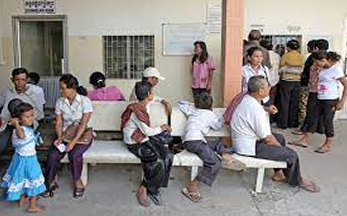Mental Health Care - WCH

Mental Health Care
Mental Health Care Centre is a sub-division of Windhoek Central Hospital. It is located between the Maternity ward and the Medical school. The centre has been in existence since 1903 and it has a bed capacity of 200 beds.
The Centre’s model of choice is the bio-psycho-social model of health which is employed in a multi-disciplinary and inter-disciplinary setting. The model looks at three components that affect mental health, namely biological, social and psychological. Aspects under biological include physical health, disability and genetic vulnerabilities. The social components focuses on aspects such as family circumstances, peers, relationships etc and psychological component looks at copying skills, self esteem and social skills, to mention only a few.
All the activities and procedures at the centre are guided by:
1. Mental Health Act number 18 of 1973
2. Criminal Procedure Act number 51 of 1977 and
3. Correctional Services Act number 9 of 2012.
Services rendered
• Medical Services (Doctors): The medical services are responsible for conducting Mental Status Examination (MSE), coming up with a diagnosis and prescribing medication.
• Mental Health Nursing: The nurses are responsible for providing mental health nursing to all in-patients and out-patients at the centre. Nurses also identify and care for the physical aspects of the patients’ problems.
• Clinical Psychology: The clinical psychologist performs psychometric tests, come up with diagnosis and provide psychotherapy. Clinical psychologist also treats individuals with emotional problems and behavioural disturbances.
• Occupational Therapy: Occupational therapy focuses on the restoration of function and improvement of social participation levels through the use of occupations such as work, self-care and leisure/play. Occupations are activities that bring meaning to the daily lives of individuals, families, and communities and enable them to participate in society.
• Clinical Social Work: Social workers promote social change and development, social cohesion and empowerment of people with mental health challenges. Social Workers carry out assessments for disability grants and also investigate the socio-economic circumstances of patients through interviews and home visits. In addition to the above mentioned, Social Workers also educate families and communities about mental health as well as accepting diagnosis, treatment and adherence to medication.
• Pharmacy: The pharmacist dispenses psychiatric medication to both inpatients and out patients and ensures that patients have access to the safest and most efficacious drugs.
•Outreach clinics: The centre conducts outreach clinics in and around Windhoek. The outreach clinic schedule is as shown in the table below.
Patients
The centre caters for persons with mental disorders, mental illness, psychiatric related complains or symptoms and these persons are of all ages, race and ethnic groups. It takes in all patients from all over Namibia. Except for Ward 16 in Oshakati it is the only mental health referral centre in Namibia. The most common conditions managed at Mental Health Care Centre include schizophrenia, mood disorders, substance related disorders, anxiety disorders etc. All patients seen at the unit should be referred from a clinic, hospital or by a health care worker. Outpatient days are strictly Mondays and Wednesdays except for emergency cases that can be attended to on any working day. Outpatient department is open every Monday to Friday from 7am to 4pm. Emergency cases coming after working hours are attended to at Katutura casualty department by the doctor on call for psychiatry. Patients are admitted under different sections of the Mental Health Act.
Section 3 – voluntary patient admission.
Section 4 – patient admission by consent.
Section 9 – certified patient admission.
Section 12 – urgent application for admission.
Sections
A. General Psychiatry
i. Outpatient Department
ii. Inpatients wards
Male A ward for acute psychotic patients, both state and private patients.
Male B ward for substance abuse related disorders.
Ward C for acute psychotic female patients, both state and private patients.
Ward D for none psychotic patients both male and female, state and private patients.
Ward E for children
B. Forensic Psychiatry section is comprised of five wards
Ground Floor A ward for male State President’s Decision (SPD) patients.
Ground Floor B for male SPD admission, female SPD patients and female observation patients.
First Floor ward for male SPD with intellectual disability/mental retardation
Maximum Security ward for male observation patients
Rehabilitation ward for male SPD pre-discharge ward.
Categories of patients in Forensic Psychiatry unit.
1. Clients for observations under sections 77, 78 and 79 of the Criminal Procedure Act 51 of 1977
2. Convicted prisoners who become mentally ill
3. Trail awaiting prisoners
4. State President’s Decision patients
Visiting Hours
1. Civil Psychiatry wards - 10H00 to 19H00 everyday
2. Observation Clients - No visitors during the first week of admission 14H00 to 15H00 every Friday from the second week of admission.
3. State President Decision patients – Saturdays and Sundays between 10H00 and 15H00
